By Rabbi Dow Marmur

JERUSALEM — According to an opinion poll just published in Yediot Achronot, Israel’s largest newspaper, more Israelis define themselves as Reform (7%) and Conservative (4%) when put together than the ultra-Orthodox haredim (10%). The largest number of religious Jews are Nationalist-Orthodox (29%).
44% of all Israelis don’t identify with any religious stream in Judaism, which suggests that almost half of the country’s population is secular. However, secular in Israel isn’t the same as in other countries. There’s something akin to secular religiosity here.
The number of Jews in Israel who today describe themselves as Reform is almost twice as many as it was seven years ago when a similar poll was conducted. Other data – wanting egalitarian services, supporting Women of the Wall, etc. – have also come to favor non-Orthodox Judaism. Many Israelis report to have been pleased to attend wedding and Bar/Bat Mitzvah celebrations conducted by non-Orthodox rabbis.
And all that has happened without Reform political clout! Haredim have three political parties in the Knesset. This enables them to hold to ransom every government. Recent days have seen another example of it, this time over public works on Shabbat. The religious nationalist politicians have also great influence.
Reform and Conservative Jews are totally outside the political power system. Some of them would like to change that. Voices are heard from time to time urging non-Orthodox religious Jews to form themselves into a political party. The new poll data may encourage their leaders to do so.
In principle, I’m among those who believe that this would be disastrous: it would force Reform’s political representatives to engage in the same kind of horse trading that others appear to be doing. Israeli politicians who call themselves religious almost invariably give Judaism a bad name.
In practice, some of us hope that those who clamor for political representation will remember that – unlike haredim, who live in tightly knit communities and follow orders from their rabbis, and unlike the nationalist-religious Zionists, many of whom live in no less tightly knit communities in West Bank settlements – most of the potential voters for non-Orthodox religious political parties are likely to stay at home on polling day.
Electoral fiasco would wipe out much of the good that the Yediot poll is implicitly promoting. For better or worse, liberals tend to lack the zeal of their opponents. What some may regard as our weakness is perhaps also our strength if we choose not to imitate opponents.
It may even be legitimate to speculate that one important reason for the rise in popularity of Reform Judaism in Israel is its non-political profile. A growing number of Israelis are fed up with politicians and their antics. To become political may spell institutional suicide.
Leaders of Reform Judaism in Israel are said to be in close contact with their counterparts in the Diaspora, particularly in North America, in search of moral and financial support. I hope that they’ll also take counsel not to rush into politics. Too much is at stake. Short-term gain may indeed lead to long-term pain.
*
Rabbi Marmur is spiritual leader emeritus of Holy Blossom Temple in Toronto, Canada. He may be contacted via dow.marmur@sdjewishworld.com